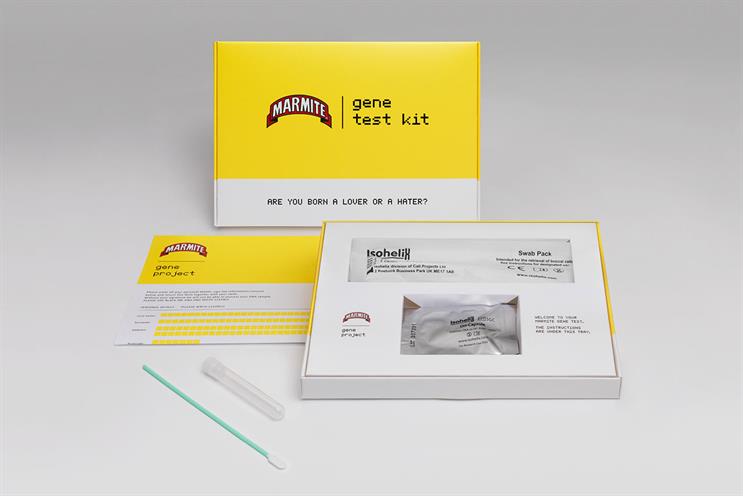Adtech isn’t the obvious career path for a genetic engineer, but where’s the fun in obvious? Every now and again, this biology background affords me a unique insight into how the world works. And from my glossy agency perch, memories of yeast cultures come rushing back; that sour stench hipsters whiff in microbreweries but biologists call "home".
The trends of DNA testing for deeper self-understanding, and wearable devices that track and analyse our every move, have been bubbling for the past three years. But in 2020, their combination will change the way millions think about something bigger than ancestry. Something bigger than fitness. Something we all need to survive.
That thing is food.
This is big news for FMCG, food and beverage, fast-food and hotel, restaurant and café brands. We've already seen Unilever's Marmite use gene-testing in a 2018 marketing campaign (pictured, above), but now the tech stands to go far beyond advertising.
A reported from giants such as Google-backed 23andMe and Chromozoom to glean even more insights into the way their bodies work. Everything from the likelihood of disease development to muscle composition and alcohol flush reaction is up for grabs. These tests promise people greater control over their holistic health (whether such promises are well-founded or scientifically valid is a debate very much for another time).
This, along with societal advances such as a broader acceptance of mental health as a legitimate part of our whole, and growing conversation about the "gut brain", is helping to fuel a consumer shift from a treat-when-sick mindset to a preventative, holistic well-being model. Finding out if we’re more likely than others to develop Alzheimer’s disease isn’t particularly helpful. Learning of fast-twitch fibre genetic composition will probably only help the marathon runners out there. But food? We can all get behind that. Who doesn’t want to eat more of what they need and less of what they don’t to live a longer, healthier life?
Personalised nutrition will be the next mainstream trend to hit the food industry. Also coined "nutrigenomics", "nutritional genetics" and other combinations of complicated words that sound medical, there are plenty start-ups and jumping on the bandwagon. A trip to London’s Covent Garden this Christmas season might have you stumbling into DNANudge’s new shop, promising the gift of tailored nutrition based on your genes to guide or perhaps repair turkey-intake damage. And with 31% of consumers claiming, you can’t blame the company.
Whether or not people use a genetic test to find out their ability to digest fats, their protein needs or alcohol metabolism rate, wearable devices are also empowering them to own their health and chart a course towards well-being backed by data. But data is just one part of the equation; it still needs to be made tangible, transformed into recommended eating habits, things to enjoy and things to avoid. This is where brands can come in.
In a new world order of complex genetics, myriad data points and general anxiety about doing the best by ourselves, there is an opportunity for brands to become allies. Chief marketing officers will enjoy newfound permission to talk to customers about how their product can align with their genetic make-up, health goals and habits. This is not about advertising; it’s about empowerment to control and curate the most important thing we all have: our health.
New channels and chances will reveal themselves to us in the next 12 months if we dare to take a step into this avant-garde world. Just as the cultural conversation around the "microbiome" or "second brain" has blossomed this year, many more biological phenomena will be up for discussion, and roles for consumables within that are opening up for those bold enough to dive in.
Three new ways to reach consumers and become a trusted advisor are: specialist clinics, testing partners and nutrition apps. How about being the first official partner to a Harley Street nutrigenomics centre to jump off the supermarket shelf and become an expert-recommended brand? Or partnering MyFitnessPal or Lifesum to appear in-app when users need a boost of vitamin B? Although your client probably isn’t about to launch a vertically integrated lab-to-label service, collaborations with start-ups and technology providers to integrate products along the health value chain could be a great way to dip a toe in this burgeoning trend.
This is also an excellent time to get ahead of the biological privacy debate that flows naturally from the past two years’ cyber-data conversations. Taking an active role in the protection of biodata from hacks, sale and other misuses is a new opportunity for brands to get the data debate right and deliver privacy levels that consumers are growing to expect.
We’re now in the grip of a holistic well-being revolution and, in 2020, people will be increasingly empowered to own, control and curate their health. More touchpoints than ever before will exist for you to bring value to your customers. I just hope your product is a little easier on the senses than my old lab.
Gracie Page is emerging technology director at VMLY&R London


